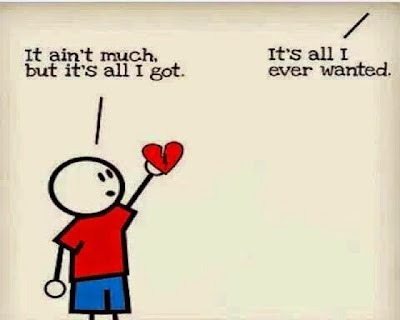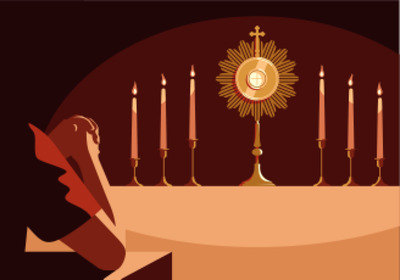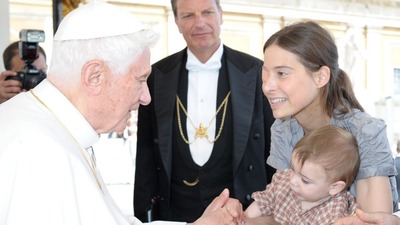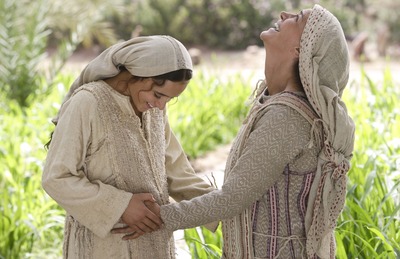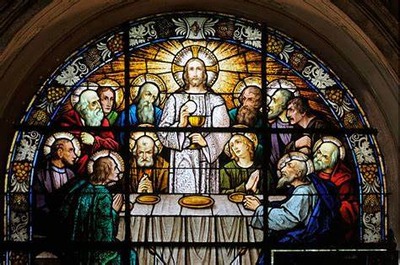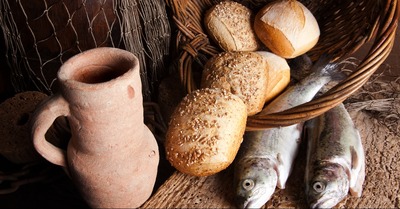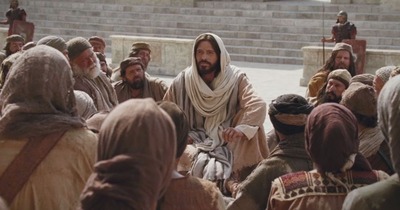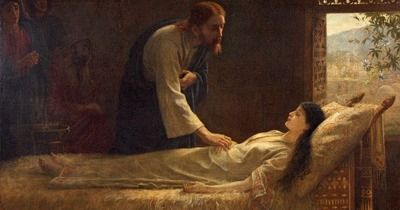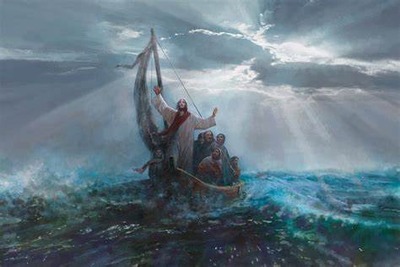August 11, 2024
|by N W
|
0 Comments
|
Baptism, Deacon Mark, Eucharist, Sacraments, St. John
Nineteenth Sunday in Ordinary Time
August 11, 2024 — Year B
Readings: 1 Kgs 19:4-8 / Ps 34 / Eph 4:30-5:2 / Jn 6:41-51
by Rev. Mr. Mark De La Hunt, Permanent Deacon
Here we are in week three of our personal Eucharistic Revival on John Chapter 6. The Eucharist, Holy Communion, Bread of Angels is the source of Christian faith and unity. In honor of this, Father Nixon and I have been alternating preaching. Father preaches on John 6 again on the 18th, and then I will preach on the last passage on August 25.
Remember that we are doing this as our little part of the three-year-long Revival in the United States. As part of your personal Eucharistic Revival, you can go to YouTube and type in EWTN Eucharistic Congress and listen to all the great Catholic speakers that were there. Keep reading and reflecting on John Chapter 6 and try to spend some time in Adoration before Jesus in the Blessed Sacrament.
Today I will focus on how Jesus responds to His followers’ disbelief in the Eucharist by using even stronger words, “I AM the living bread…whoever eats this bread will live forever; and the bread that I will give is my flesh (Jn 6: 51).” Next week, Fr. Nixon will preach on how Jesus’ followers began to argue among themselves over this teaching. His disciples asked, “How can this man give us His flesh to eat (Jn 6:52)?” Jesus answered them, “…my flesh is true food and, my blood is true drink (Jn 6:55).” And keep in mind that when families and Christians reject Jesus’ teaching on the Eucharist because it does not align with their personal beliefs, unity is lost. On Sunday, August 25, I will preach on the sad news that because of this teaching, “many of his disciples returned to their former way of life and no longer accompanied him (Jn 6:66).”
The Eucharistic Congress’s invitation had these words, “Come and find Joy, Healing, Hope, Peace, Unity, Meaning, Revival.” Those gifts have been true for me personally, and I know from conversations with some of you, they have been true for others too. However, globally, we do not experience unity as Christians. Here is a story about the Eucharist that a parishioner from Holy Name of Mary shared with my wife and me over dinner one evening and that illustrates the rift in Christian unity around the Eucharist. That lack of unity is why Christians, who are not in full communion with the Church Jesus Christ founded, cannot receive the Eucharist.
She grew up in a rural evangelical faith community, learned about the Lord, and was given the gift of faith. However, the children at that church were taught from an infamous tract called the “Death Cookie” that mocks the Catholic belief in the Eucharist. They were also taught to not associate with Catholics and to avoid their teachings.
One of the teachings they rejected was baptism by sprinkling of water on the head. They believed it had to be only by full immersion. This woman’s grandmother, due to her great fear of water, was never baptized. The leaders of this small rural church were not aware that the first Christians, during the time of the apostles, wrote about the acceptable practice of baptism by sprinkling, in a writing called the Didache. As God would have it, our friend began to date a Catholic boy in high school who told her and her grandmother about baptism by sprinkling water on the head.
Later, her grandmother became ill and was close to death in a hospital. She asked for a Catholic priest to baptize her. However, her family could not bring themselves to let the priest in the room, and the grandmother died without being baptized. This traumatized our friend, and she began to question what she had been taught. She loved her grandmother so much. She told us, “Whenever I went to visit Grandma, she always had non-paraffin candles burning, and she would envelope me in a hug. I always felt safe at Grandma’s.” More on this story later. And, yes, it has a Eucharistically-remarkable ending.
I want to take a moment to explain the lack of Christian unity around the Eucharist. Not to disparage other Christian churches, but to help us to avoid teaching that does not come from the apostles, and to better understand why non-Catholic Christians cannot receive Holy Communion in a Catholic church.
Many non-Catholic Christians have communion services in obedience to Jesus’ command to “[d]o this in memory of me (Lk 22:19-20).” But to my knowledge none believes in Jesus’ substantive presence in the bread (His flesh) and wine (His blood), what the Church calls transubstantiation, except for the Eastern Orthodox who have unbroken apostolic succession, same as the Roman Catholic Church.
Some of you may think the Anglican/Episcopalian Church teaches transubstantiation, but it does not. From their Thirty-Nine Articles of Religion, Article 28 reads, “Transubstantiation (or the change of the substance of bread and wine) in the Supper of the Lord, cannot be proved by Holy Writ, but is repugnant to the plain words of Scripture…and hath given occasion to many superstitions. The Sacrament of the Lord’s Supper was not by Christ’s ordinance reserved, carried about, lifted up, or worshipped.”
Anglicans/Episcopalians, Lutherans, and Presbyterians have similar beliefs about the Eucharist, namely what is called consubstantiation. That is, they believe the presence of Christ is “with, in, or under” the bread and wine. Methodists might say it is a spiritual presence. All four of those Protestant traditions use the term “real presence,” but they mean spiritual. Some Christians believe Eucharist is simply a fellowship meal to thank God, and some think the bread and wine are purely symbols of Christ’s body and blood. And there are still more variations of Eucharistic beliefs. However, only one of these beliefs can be the truth. The truth is not a something, it is a Someone, Jesus. He said, “I am the truth.” He said the bread is His flesh, and He is God, and what God says is (Barron 503).
Back to the gospel, what did Jesus say? “I am the living bread that came down from heaven; whoever eats this bread will live forever, and the bread that I will give is my flesh for the life of the world (John 6: 51). One Presbyterian apologist (someone who is defending their beliefs) wrote that Jesus couldn’t be speaking literally because the Last Supper had not yet happened. Notice Jesus’ verb tense though, “The bread that I WILL give…” It is future tense. Jesus was telling the crowd what he was GOING to do at the Last Supper.
Many of you may have discussed your faith with Protestant family and friends, and that is a wonderful thing. Keep doing this, and remember that you are on sacred ground when you do so. These conversations should be approached with love, patience, and humility.
If you have done this, then you have likely heard them start the conversation with, “We can only discuss this from scripture.” Why do they say this? After all, the New Testament was not definitively declared until the year 382. A lot of history occurred before that time. What were the Christians doing during those nearly four hundred years? They were passing on what the apostles taught them, and what they passed on regarding the Eucharist is exactly what we believe. Here are three quotes during those 382 years from Bishop Barron’s Word on Fire Bible on the Gospels.
St. Ignatius of Antioch was born two years after Jesus was crucified, and he was taught by the Apostle John who wrote John Chapter 6. Ignatius wrote, “Come together in common through grace, individually, in one faith, and in Jesus Christ…In this way you will obey the bishop and the presbytery (priesthood) with an undivided mind, breaking one and the same bread, which is the medicine of immortality and the antidote to prevent us from dying, enabling us to live forever in Jesus Christ (Ignatius’s Epistle to Ephesians / Jn 6:50-53).”
St. Justin Martyr was eight years old when St. Ignatius died. In his defense of the faith, he wrote, “We call this food Eucharist…Not as common bread nor common drink do we receive these; but since Jesus Christ our Savior was made incarnate by the word of God and had both flesh and blood for our salvation, so too…the food which has been made into the Eucharist…is both the flesh and the blood of that incarnated Jesus (Justin’s First Apology / Jn 6:55).”
The teaching that Jesus gave to John that was passed on to Ignatius and Justin did not die with them. St. Gregory of Nyssa, a bishop, was alive in 382 when the twenty-seven books of the New Testament were confirmed by a gathering of Catholic bishops. He wrote, “The bread again is at first common bread; but when the mystery sanctifies it, it is called and actually becomes the Body of Christ (Gregory On the Baptism of Christ / Jn 6:55).”
Brothers and sisters, our belief in the Eucharist can be proven from scripture AND history, so be at peace about it and give thanks for it. And by the way, studying the writings of the early Church Fathers is what led the great Anglican priest and theologian, John Henry Newman into full communion with the Catholic Church. He is now called St. John Henry Newman.
Back to our Eucharist story. The whole situation around her grandmother’s not being baptized caused her to question what her church taught. Still, she had no intention of becoming Catholic. But she did pepper her boyfriend’s priest with questions about Catholic teachings. Father patiently answered these questions over the course of a year, but she made it clear she had no intention of becoming Catholic. One evening Father asked her, “What exactly is it you want?” Still, she was non-committal.
That evening, however, Father felt moved to do something new. He said, “Follow me,” and he led her through the parish hallways to the narthex. She could see people inside the nave, kneeling in prayer and a decorative gold stand on an altar with the Eucharist held in it. She had never stepped foot inside a Catholic Church. And yet, here she was with a Catholic priest, about to lead her in there while people prayed before the “death cookie.” From Father’s year of teaching, she knew Catholics believed that the bread was truly Jesus in the flesh, so she knew why people were kneeling in prayer, but this went against everything she had been taught growing up. You can imagine how uncomfortable she was feeling.
Still, she followed Father inside and accepted his invitation to kneel and pray. It was then that she came to believe in Jesus in the Eucharist as taught by Him, John, Ignatius, Justin, and Gregory! The Holy Spirit moved in a powerful way.
The smell of the candles burning before the monstrance brought her back to her grandmother’s home, where she smelled Grandma’s candles burning, felt again her grandmother’s hug, and was overcome by the feeling of safety she always felt there. This is grace, but Jesus is so generous. Not only did she experience these comforting things, but she said the feelings were even more intense than they were when Grandma was alive.
Her grandmother, with her desire for baptism, had led her granddaughter to adoration that night. I can just imagine Grandma, baptized by desire (a Catholic teaching), adoring Christ before the heavenly altar, a vision John wrote about in the book of Revelation, and her granddaughter adoring Him before that Catholic altar where heaven and earth touch (CCC 1259; Rev 8). God is so good.
I thought about our friend when I prayed over today’s Psalm 34, “When the afflicted [woman] cried out, the Lord heard, and from all [her] distress He saved [her] (Ps 34: 6).” He does the same for each of us every Eucharist. We bring all this baggage and sin to the altar with us, and, in the Eucharist, Jesus takes it away. *
Glory be to the Father, and to the Son, and to the Holy Spirit as it was in the beginning with Jesus, John, Ignatius, Justin, and Gregory, and is now with you and me and Father, and ever shall be world without end. Amen.
*The Eucharist removes venial sins, but mortal sin must be removed through the sacrament of Confession.
Citations
- Bishop Robert Barron. Word on Fire Bible – The Gospels. Word on Fire 2020.
- Got Questions.org. Copyright 2002-2024. What is Consubstantiation?
- OrthodoxChurchFathers.com. The Life and Writings of Gregory of Nyssa.
- Tom Nash. Who Compiled the Bible & When? Catholic Answers 1996-2024. Catholic.com.
- A Potter’s View. World Communion Theology and United Methodism. September 30, 2015. wtmcclendon.wordpress.com
- The Orthodox Presbyterian Church. Transubstantiation. January 27, 2008. OPC.org
- Fr. Dwight Longenecker. The Death Cookie…Not. 2024 dwightlongenecker.com
KEEP READING
 540-586-8988
540-586-8988 

